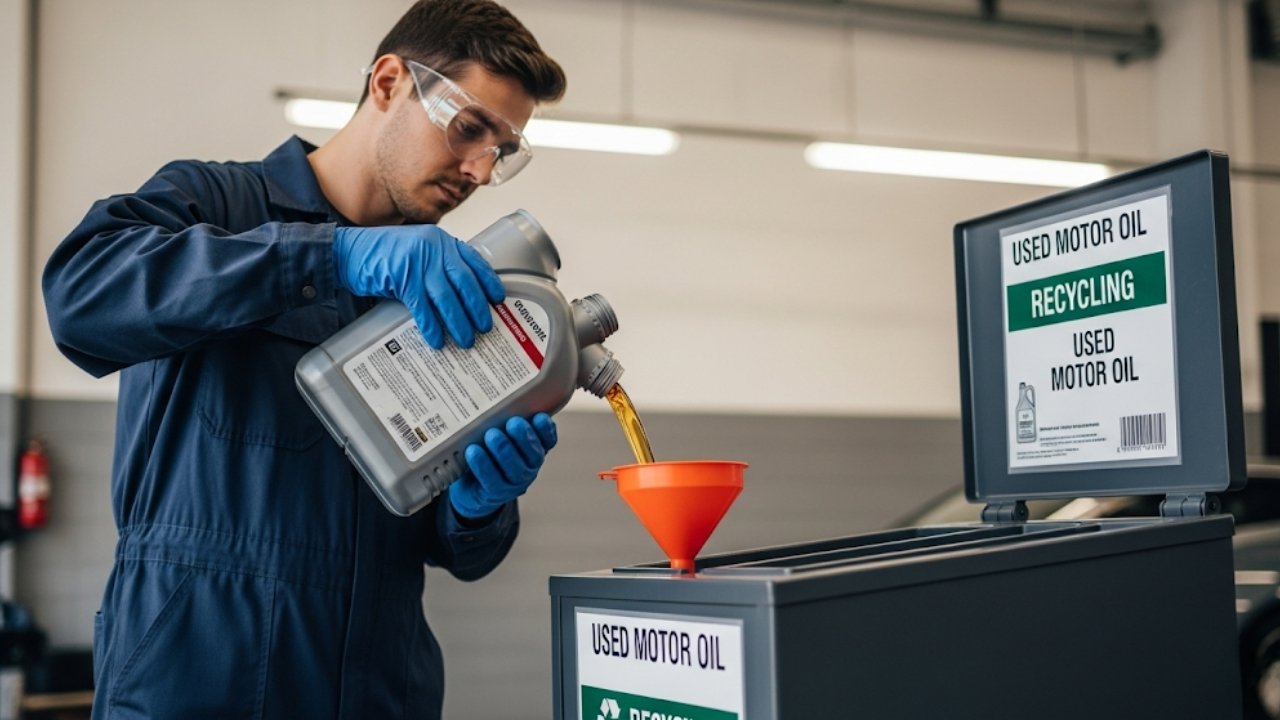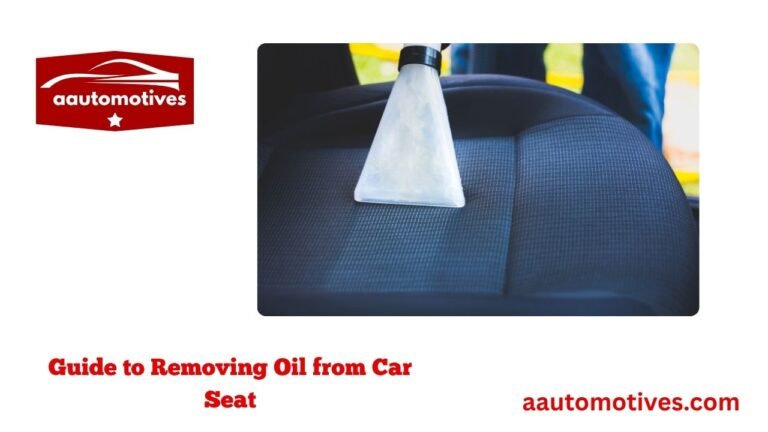How to Dispose Car Oil Safely and Responsibly

Changing your car’s oil feels like a small DIY win. It saves money and keeps your engine happy. But then comes the messy part—what do you do with the old oil? You can’t just pour it down the drain or dump it behind the garage. That’s not just harmful, it’s illegal in many places. Learning how to dispose car oil the right way isn’t just responsible—it shows respect for your community and the environment.
In this guide, I’ll walk you through the entire process of safe car oil disposal. I’ll share stories, simple instructions, real facts, and maybe even open your eyes to a few things you didn’t know. Trust me, I used to toss my old oil can in the trash until I learned what that meant for the soil and water around my neighborhood.
Let’s start with why it matters—and then we’ll get to how to dispose car oil the right way.
Why Proper Car Oil Disposal Matters (It’s Bigger Than You Think)

When I realized that the oil from just one car can damage an entire ecosystem, I felt a deep sense of guilt. But guilt without action is just noise. That’s why learning how to dispose car oil is a simple but powerful step toward change.
Used oil contains heavy metals and toxic substances. When burned or spilled carelessly, it releases harmful fumes into the air. It also clogs up waste systems and increases the cost of water treatment. It’s not just about the planet—it’s about the people living on it.
What Exactly Is Used Car Oil?
Used car oil isn’t the same as the clean, amber-colored lubricant you pour into your engine. After running through your car’s system, it becomes a black, sludgy liquid full of contaminants:
Dirt and debris from engine parts
Metal shavings
Combustion byproducts
Additive breakdown residue
Moisture from engine heat
All these make used car oil hazardous. But here’s the good news: even dirty oil can be recycled and re-refined into new oil or other usable products. It’s a bit like how we melt down plastic to make new containers.
So instead of treating old oil like trash, we should treat it like a resource.
Step-by-Step Guide: How to Dispose Car Oil Properly
Here comes the part you’re waiting for—the actual steps. The good news is, disposing of old car oil isn’t as hard as people think. You don’t need a permit or a hazmat suit—just a little care.
1. Drain It Safely
When doing an oil change yourself, always drain the used oil into a clean, leak-proof container. A funnel can help prevent spills. I use a wide-mouthed plastic drain pan with a screw-top lid—super easy to carry and reuse.
Pro tip: Never mix oil with other fluids like antifreeze or brake fluid. Mixing makes recycling impossible.
2. Store It Correctly
Once drained, store the used oil in a tightly sealed plastic container. Old milk jugs or detergent bottles work well if cleaned properly. Label it clearly: “USED MOTOR OIL.” That avoids confusion later.
Keep it away from sunlight, kids, pets, or curious neighbors. Store it upright in a cool, dry place until disposal.
3. Find a Disposal Location Near You
This step is easier than ever. Most towns or cities have oil recycling stations or hazardous waste collection centers. You can also drop it off at:
Auto parts stores (like AutoZone, Advance Auto Parts, NAPA)
Some service stations and garages
Local recycling centers
Municipal hazardous waste drop-off events
Tip: Call ahead. Some places accept used oil filters too (more on that soon). Others only take the oil.
4. Recycle or Re-Refine
Once dropped off, your oil is not just “thrown away.” Most of it gets re-refined and reused. Here’s what happens to recycled car oil:
| Recycled Oil Use | What It Becomes |
|---|---|
| Re-refined motor oil | High-quality new engine oil |
| Industrial burner fuel | Energy for factories, ships, etc. |
| Lubricants | Hydraulic oil, gear oil, etc. |
| Processed into raw materials | Used in asphalt, roofing tar |
So, every time you dispose car oil correctly, you’re helping save energy, reduce emissions, and conserve resources.
Used Oil Filters: Don’t Forget These!
Most people throw away the oil filter without a second thought. But it contains trapped oil and metal parts that need recycling too.
Here’s what to do:
Let the filter drain (upside down) for at least 12 hours.
Place it in a sealed plastic bag or can.
Take it to the same place where you dispose of the oil.
Some areas have special rules for filters, especially if they are from diesel vehicles. Always check local guidelines.
Can I Throw Car Oil in the Trash or Pour It Down the Drain?
Let’s clear this up once and for all: No, never.
Disposing of car oil improperly is:
Harmful to the environment
Dangerous to your plumbing and water system
Illegal in many states and countries
Fined heavily if caught (up to $10,000 or more!)
When I was in college, a friend of mine poured oil into a storm drain after a DIY change. A neighbor reported it. He had to pay a fine, attend environmental awareness training, and clean up an oil-stained creek bed. Not a fun weekend.
Quick Checklist: How to Dispose Car Oil the Right Way
Here’s a quick wrap-up you can save or print:
✅ Drain into a clean container
✅ Label it as “Used Motor Oil”
✅ Never mix it with other fluids
✅ Store in a safe place
✅ Find a certified drop-off location
✅ Recycle filters too
Is There a Fine for Improper Oil Disposal?
Yes. Improper disposal of used car oil can lead to serious legal consequences. Here are some common penalties:
| Violation Type | Possible Fine or Punishment |
|---|---|
| Dumping in drains or soil | $1,000 to $10,000+ (varies by state) |
| Mixing oil with trash | Civil penalties and citation |
| Illegal burning of motor oil | Environmental hazard charge |
Also, if your action leads to contamination of a public water supply, cleanup costs can be charged to you. It’s not worth the risk.
Common Myths About Car Oil Disposal (Don’t Fall for These!)
Disposing of car oil sounds simple, but there’s a surprising number of myths floating around. Here are a few I believed myself—until I did the research.
Myth #1: It’s Okay to Dump Oil in the Yard
Nope. It may soak into the ground, but it doesn’t disappear. It seeps into underground water and poisons the soil. You might not notice now, but years later, plants won’t grow there. And rain can wash it into nearby water bodies.
Myth #2: Small Amounts Don’t Matter
Whether it’s half a quart or five, every drop counts. Even a spoonful of oil can contaminate water for wildlife. Small leaks in driveways eventually become big environmental issues.
Myth #3: Burning Used Oil is Safe
Unless you have a certified oil-burning heater used in some industrial zones, burning oil at home releases toxic fumes like lead and arsenic. That smoke goes into your lungs and the atmosphere. It’s just not worth the health risks.
Myth #4: Oil Recycling Is Pointless
Actually, used oil never “goes bad”—it just gets dirty. It can be cleaned, filtered, and reused multiple times. In fact, it takes 42 gallons of crude oil to make 2½ quarts of new oil, but only 1 gallon of used oil to do the same. That’s real savings.
Cultural Insight: Why It’s More Than Just Oil
In many cultures, especially in rural areas, people believe waste should “return to the land.” But oil isn’t compost or leftover food—it’s synthetic, processed, and packed with chemicals.
Back in my village, I once saw an uncle use old engine oil to “kill weeds.” He’d pour it in the corners of the yard to stop grass from growing. Sure, it worked—but it also killed soil microbes, birds, and insects. The spot never grew anything again. That left a deep impression on me.
It’s not about blaming past habits. It’s about learning, evolving, and doing better—for us and for the generations coming after.
How to Get Others Involved (A Small Movement)
You can make a big impact by encouraging your neighbors, friends, or family to learn how to dispose car oil responsibly. Here’s how:
Talk about it at local meetups or community centers.
Share your own process on social media—snap a pic when you drop off used oil.
Start a collection group for DIYers in your area. One person can drop off everyone’s oil once a month.
Print flyers from your municipality’s recycling center to hand out at auto stores or garages.
This creates a ripple effect. One household doing it right becomes ten. Ten becomes fifty. That’s how real change starts—quietly but steadily.
FAQs About How to Dispose Car Oil
1. Can I throw away oil in a sealed container?
No. Even if it’s sealed, used motor oil should not be thrown in the trash. It can leak during transport or at the landfill, contaminating the environment.
2. How long can I store used oil before disposal?
Used oil can be stored for several months if kept in a sealed, labeled container away from heat or direct sunlight. However, it’s best to dispose of it within 3 months.
3. What happens if I mix oil with other fluids?
Mixed fluids (like oil and antifreeze) are considered hazardous waste and cannot be recycled easily. You’ll need to contact a hazardous waste handler, which may charge a fee.
4. Can I reuse old oil in my car after filtering it?
Not recommended. DIY filtering doesn’t remove microscopic particles and chemical degradation. It could damage your engine. Always let professionals re-refine oil.
5. Is it safe to dispose oil in a compost pit or burn pile?
Absolutely not. It poisons compost and releases dangerous fumes when burned. Oil must be treated as hazardous waste.
6. Do all auto parts stores accept used oil?
Many do, but not all. Always call ahead. Some have limits per drop-off or require a purchase receipt.
7. Can I dispose oil filters the same way?
Yes, but they must be drained and stored in a leak-proof bag or container. Most recycling centers take both oil and filters together.
8. How do I find a nearby oil recycling center?
You can use online tools like:
Earth911.com
RecycleNation
Your local municipal waste website
Just search “how to dispose car oil near me” and enter your ZIP code.
Bonus Tips for Eco-Friendly DIY Oil Changes
Want to take it a step further? Try these eco-upgrades for your garage routine:
Use reusable oil change pans and filters.
Choose biodegradable gloves and cloths.
Buy synthetic oils that last longer between changes.
Learn how to track oil life with dipstick readings, not just mileage.
Schedule group drop-offs to save time and gas.
Final Thoughts: Your Oil, Your Responsibility
It might seem like a few quarts of dirty oil. But in the grand scheme, it’s about what kind of mark we want to leave behind.
You don’t need to be a tree-hugger or an eco-warrior. You just need to do your part. Every time you properly dispose of your oil, you’re:
Keeping water clean
Protecting wildlife
Saving energy
Teaching others by example
And honestly, it feels good. Like brushing your teeth or returning a shopping cart—it’s a small act of integrity. The kind the world needs more of.






